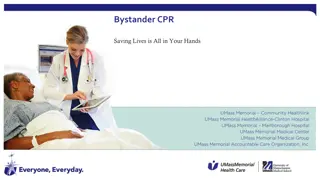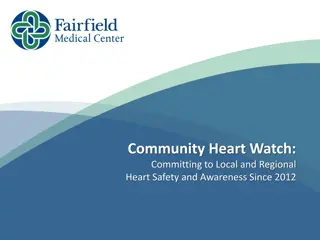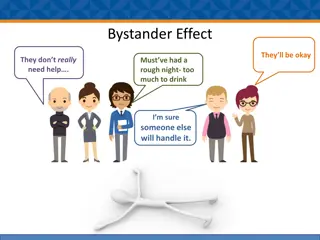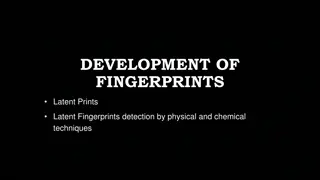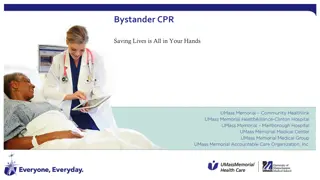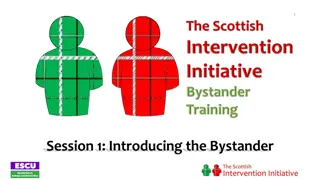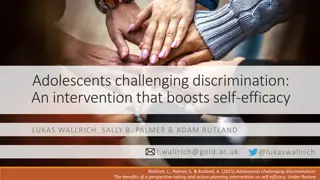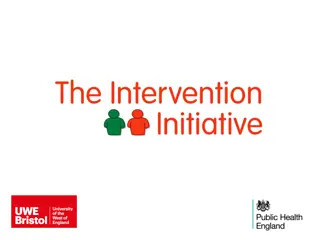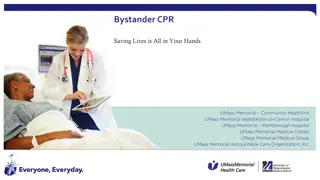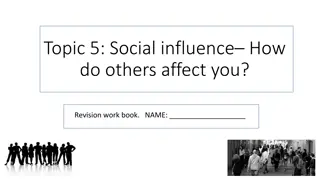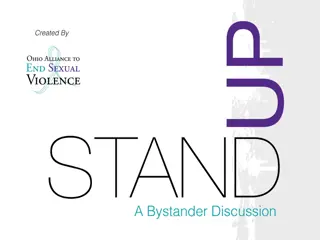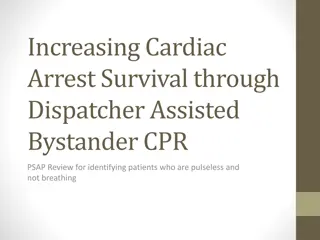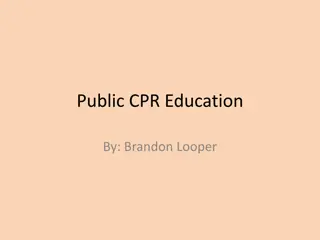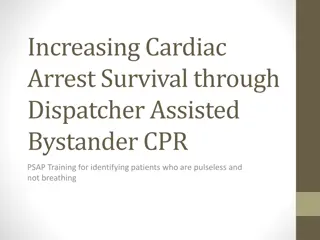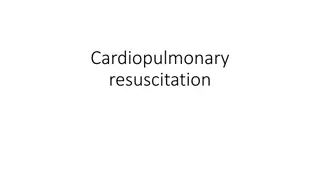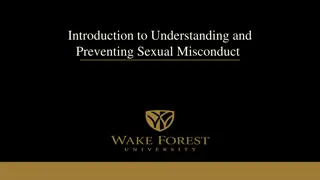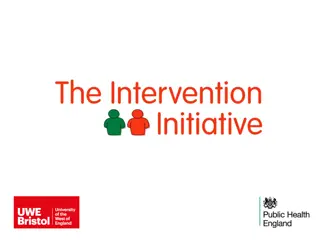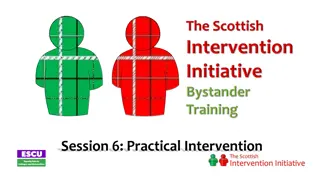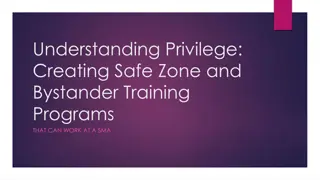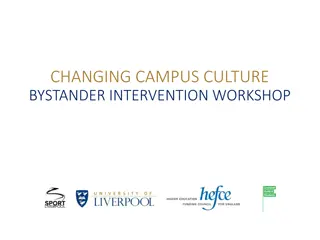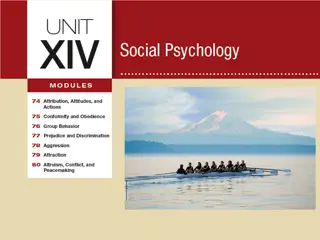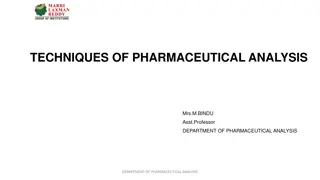Understanding Kinesiology Taping Techniques and Benefits
Kinesiology taping is a technique utilizing thin, flexible tape to relieve pain, reduce swelling, and provide support to muscles and joints. Introduced by Dr. Kenzo Kase in the 1970s, it includes techniques such as muscle, ligament, fascial, correction, lymphatic drainage, and functional movement te
8 views • 14 slides
Understanding Measurement Scales and Scaling Techniques
Measurement scales play a crucial role in marketing research, with techniques like scaling helping to categorize data. The content discusses four types of measurement scales: nominal, ordinal, interval, and ratio, outlining their characteristics and differences. Scaling techniques involve placing re
5 views • 7 slides
Bystander CPR: Steps to Save Lives & Facts About Cardiac Arrest
Learn the importance of bystander CPR in saving lives during sudden cardiac arrest incidents. Understand the steps to perform hands-only CPR, identify compression rates, and the role of the Good Samaritan law. Discover key facts about sudden cardiac arrest and how bystander intervention can signific
1 views • 13 slides
GROUP CHAT
Explore the impact of hurtful comments online, consider bystander intervention, and navigate a situation where friends are making nasty remarks in a group chat. Reflect on thoughts and options to address the situation effectively.
0 views • 9 slides
Community Heart Safety and Awareness Initiative since 2012
Since 2012, Community Heart Watch has been dedicated to promoting local and regional heart safety and awareness. Sudden Cardiac Arrest (SCA) is a serious condition affecting people of all ages, with prompt CPR and defibrillation being crucial for survival. By emphasizing community engagement and res
0 views • 20 slides
Techniques for Investigating Plant Metabolic Pathways and Biogenetic Studies
This content explores various techniques used in pharmacognosy and phytochemistry to investigate the metabolic pathways in plants and study the formation of primary and secondary metabolites. Methods such as utilizing radioactive isotopes, tracer techniques, isolated organs/tissues, grafting, and mu
4 views • 12 slides
Understanding Criminal Behavior from a Social Psychological Perspective
This unit delves into the application of social psychology in the legal system, exploring the nature of criminal behavior, responses to criminal acts, the criminal justice system, and rehabilitation. It examines the social ecological perspective of criminal acts and outlines key points related to th
0 views • 50 slides
Bystander Intervention Strategies for Challenging Situations
Learn about the bystander effect, the 4Ds of bystander intervention (Direct, Distract, Delay, Delegate), and effective ways to address unacceptable behavior. Empower yourself to take action and support those in need by understanding these strategies and utilizing them in various scenarios.
0 views • 6 slides
Understanding Fingerprint Development Techniques
Exploring the development of latent fingerprints through physical and chemical methods, conditions affecting latent prints, and various fingerprint development techniques like visual examination, powder techniques, and chemical techniques. Techniques such as alternate light sources and powder method
2 views • 22 slides
Learn How to Perform Hands-Only CPR and Save Lives
Perform life-saving hands-only CPR with these steps: call 911, check responsiveness, use an AED if available, and start chest compressions. Understand the importance of bystander CPR, know the Good Samaritan law, and be prepared to act in case of sudden cardiac arrest. By being proactive, you can si
0 views • 13 slides
Understanding Bystander Intervention in Sensitive Situations
Learn about the role of a bystander in sensitive situations, including types of bystanders and how to intervene effectively. Explore scenarios and factors affecting intervention and non-intervention, emphasizing the importance of noticing, interpreting, feeling responsible, and possessing necessary
1 views • 20 slides
Understanding Sexism and its Impact: Bystander Intervention Programme
National crime statistics reveal a concerning number of crimes against women such as domestic abuse, sexual assault, rape, and murder. This programme aims to address sexist language and behaviors to create a culture of respect and equity, combating misogyny and misandry. Learn about the harm caused
0 views • 16 slides
Intervention Boosting Self-Efficacy Among Adolescents Challenging Discrimination
Adolescents challenging discrimination through a perspective-taking and action-planning intervention showed increased self-efficacy, particularly among White participants. The intervention, which included facilitated discussion sessions, led to positive outcomes and highlighted the importance of bys
0 views • 7 slides
Understanding Bystander Intervention in Social Norms Discussion
Explore the dynamics of bystander intervention in social norms discussions, highlighting the importance of noticing, interpreting, feeling responsible, and possessing necessary skills to act. Learn through real-life scenarios and discussion questions to understand when and how intervention can occur
1 views • 19 slides
Bystander CPR: Steps to Save Lives During Cardiac Arrest
Learn how to perform hands-only CPR effectively in case of cardiac arrest. Understand the importance of quick action, proper compression rate, and the Good Samaritan law. Discover facts about sudden cardiac arrest and why bystander CPR can significantly increase survival rates. Follow a guide on wha
0 views • 13 slides
Understanding Social Influence: How Others Shape Behavior
Explore the intricate ways in which social influence impacts our behavior, from conformity to obedience, and the bystander effect. Learn key terms associated with social influence and how to prevent blind obedience to authority figures. Delve into case studies and real-life examples to deepen your u
0 views • 30 slides
Bystander Intervention: Empowering Change in Challenging Situations
Delve into the concept of bystander intervention through engaging activities like role-plays and discussions. Explore barriers, solutions, and the importance of being an active bystander or upstander in various scenarios. Learn strategies to intervene effectively and make a positive impact.
0 views • 12 slides
From Bystanders to Upstanders Training Guide
Training materials developed by Randy Randolph and Yasmin Turk, facilitated by Tiffany Puett, provide guidelines for safe and productive conversations, steps to become an upstander, and definitions of terms like violence, target, aggressor, bystander, and upstander. The materials emphasize self-talk
0 views • 15 slides
Enhancing Cardiac Arrest Survival Through Dispatcher-Assisted Bystander CPR
This presentation emphasizes the importance of dispatcher-assisted bystander CPR in identifying pulseless, non-breathing patients to improve cardiac arrest survival rates. Highlighting the need for community involvement, it showcases the impact of prompt response and effective CPR on increasing surv
0 views • 10 slides
Understanding Sudden Cardiac Arrest: Facts, Statistics, and Treatment
Sudden cardiac arrest is a critical condition where the heart suddenly stops beating, leading to a lack of blood flow to vital organs. Learn about the definition, statistics, importance of early CPR, and treatments for sudden cardiac arrest to increase survival rates. Bystander participation in perf
0 views • 13 slides
Improving Cardiac Arrest Survival Rates Through Dispatcher-Assisted Bystander CPR Training
This project aims to increase cardiac arrest survival rates by training dispatchers to assist bystanders in providing CPR to patients who are pulseless and not breathing. By bringing dispatcher-assisted CPR to Milwaukee County, the goal is to enhance bystander CPR rates and ultimately improve cardia
0 views • 28 slides
Quality of Care for Patients Following Out-of-Hospital Cardiac Arrest
This review focuses on the quality of care provided to adult patients aged 16 years and older who were admitted to the hospital after experiencing an out-of-hospital cardiac arrest. Key messages highlight the importance of strategies for rapid and high-quality resuscitation, documentation of advance
0 views • 24 slides
Understanding Cardiopulmonary Resuscitation (CPR) and Cardiac Arrest
Cardiopulmonary resuscitation (CPR) is crucial in cases of cardiac arrest, a leading cause of death globally. Immediate recognition of symptoms such as unresponsiveness and abnormal breathing, early activation of emergency services, and prompt initiation of CPR can significantly improve survival rat
0 views • 23 slides
Understanding Bullying: The Power of One in Making a Difference
Explore the dynamics of bullying, from the roles of the bully, the bullied, and the bystander to the types and reasons behind bullying. Learn how each individual has the power to make a difference and take action against bullying. Empower yourself with strategies to address bullying effectively and
0 views • 8 slides
Understanding and Preventing Sexual Misconduct at Wake Forest University
Welcome to Wake Forest University's educational module on Understanding and Preventing Sexual Misconduct. This module covers behaviors constituting unlawful sexual misconduct, responsibilities for reporting, bystander intervention, ways to reduce risk, avenues to report, and receive support. Wake Fo
0 views • 25 slides
Intervention Strategies for Sensitive Situations in Group Settings
Learn about practical intervention techniques in sensitive scenarios within group dynamics. Explore the importance of creating a safe space, setting ground rules, and recognizing when to intervene. Discover how to address challenging behaviors and promote respectful communication within a group envi
0 views • 9 slides
Creating a Safe Learning Environment for Sensitive Discussions
In this programme, we will learn and work together as a group on sensitive topics. It is essential to maintain confidentiality, use appropriate language, attend sessions, and communicate respectfully. Participants may choose to leave if they feel uncomfortable. The content includes experiential and
0 views • 9 slides
Understanding Privilege and Creating Safe Zone Programs at SMA
Creating safe spaces and bystander training programs at SMA involves launching interventions, ally programs, and understanding campus-wide privilege. The agenda includes sharing resources, discussing campus climate challenges, and promoting collaboration. Introductions highlight key personnel. Outco
0 views • 18 slides
Understanding Bullying of Students with Disabilities
Students with disabilities are at a higher risk of being bullied compared to their nondisabled peers, impacting their ability to learn. Bullying based on disability can be considered harassment, a civil rights issue. Federal and state laws protect these students, emphasizing the importance of bystan
0 views • 11 slides
Understanding and Addressing Academic Bullying in Educational Settings
Academic bullying involves intentional, repetitive, and hostile behavior that creates a threatening environment leading to psychological and physical harm. This initiative by the Graduate School at Virginia Tech aims to disrupt academic bullying by identifying types of bullying, defining roles, and
1 views • 13 slides
Wayne State University's Commitment to Addressing Sexual Misconduct
Wayne State University (WSU) takes sexual assault and sexual harassment seriously, meeting its obligations under Title IX and university policies. New measures have been implemented, including online training modules, bystander intervention training, and clear reporting processes. Title IX Coordinat
0 views • 15 slides
Factors Influencing Prosocial Behavior in Social Situations
This selection of specialized psychological texts delves into the specific determinants of prosocial behavior, highlighting the impact of various factors on individuals' willingness to offer aid. It discusses how characteristics of the helper and person in need, along with situational elements like
0 views • 35 slides
Understanding Bystander Intervention and Victim Impact
This content provides a comprehensive guide on bystander intervention, highlighting the internal stages and effective strategies for bystanders to intervene in potentially harmful situations. It also explores the impact on victims of sexual assault, focusing on themes like control, self-blame, trust
0 views • 7 slides
Understanding and Preventing Sexual Misconduct at Wake Forest University
Welcome to Wake Forest University's educational module on understanding and preventing sexual misconduct. This material covers unlawful behaviors, responsibilities for reporting, bystander intervention, and reporting avenues. The university is committed to maintaining a safe and inclusive environmen
0 views • 25 slides
Creating Safe Campus Environments: Bystander Intervention Workshop Overview
Explore the dynamics of bystander intervention through a workshop addressing sexual misconduct and online harassment. Gain knowledge, skills, and empowerment to challenge and prevent such incidents. Statistics reveal the prevalence of these issues, emphasizing the importance of creating a safe and w
0 views • 23 slides
Acts of Altruism & Social Response: Stories of Bravery and Indifference
In the midst of crisis, individuals like Carl Wilkens and Paul Rusesabagina displayed remarkable altruism by risking their lives to save others during the Rwandan genocide. On the other hand, the tragic case of Kitty Genovese highlights the bystander effect and the consequences of social apathy. Und
0 views • 47 slides
Understanding Fingerprint Development Techniques
Latent fingerprints are hidden impressions left by the friction ridges of the skin which require physical or chemical techniques for visualization. Factors affecting latent prints include surface type, touch manner, weather, humidity, perspiration, and suspect care. Techniques such as visual examina
0 views • 22 slides
Analytical Techniques in Pharmaceutical Analysis
Analytical techniques play a crucial role in determining the identification and concentration of chemical substances in pharmaceutical analysis. Techniques range from simple gravimetric analysis to sophisticated methods using specialized instrumentation. Various techniques like gravimetric, titrimet
0 views • 17 slides
Understanding Bystander Intervention, Consent, and Social Conformity
Explore the concepts of bystander intervention, consent, and social conformity in this informative guide. Learn how to recognize potentially harmful situations, overcome obstacles to intervening, and navigate societal expectations. Understand the importance of obtaining consent and challenging socia
0 views • 7 slides
Microscopic Techniques in Cell Biology: Lessons and Labs Overview
Explore the fascinating world of optical microscopy in cellular biology, covering topics such as image formation, contrasting techniques, fluorescence microscopy, live-imaging techniques, and quantitative microscopy. Dive into the principles behind various microscopy techniques and experimental labs
0 views • 7 slides


